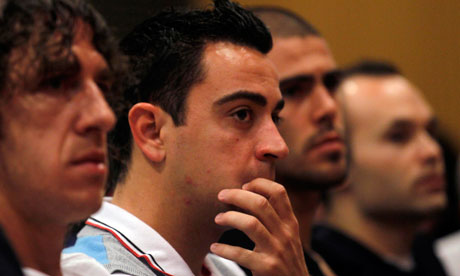Pep Guardiola was father figure to Barcelona's generation of genius
For all the 13 trophies and the countless hours of sumptuous football produced during his four years as Barcelona's head coach, nothing in Pep Guardiola's term of office became him like the leaving of it. Modest and dignified, his departure typified a man whose labours helped the club he loves to accumulate millions of admirers around the world.
Johan Cruyff laid the foundations and Frank Rijkaard embellished the superstructure, but it was during Guardiola's time that the work reached fruition. Steeped in the club's history and traditions, the young Catalan, in his first senior coaching job, was able to distill the essence of the Barça style and to present it as a new philosophy of the game. He did so with a grace and an intelligence, and a refusal to seek personal attention, that shamed some of his rivals.
Which is not to say that the stresses of the past four seasons have not, in recent months, shaken his poise and frayed his good humour. But if anyone revived the practically extinct idea of class in football, it was him. And shame on the Sky News presenter who insinuated on Thursday evening, with a cynical sneer in his voice, that the uncertainty over his future with Barcelona must have meant that he was holding out for a mammoth pay rise.
That he has chosen to announce his departure after such a traumatic 10 days is an eloquent testament to the attritional nature of the job. Like his players, in the end Guardiola seemed to have run out of mental puff. He has been right about so much that it would be foolish to suggest he has not made the correct judgment this time, too, allowing fresher minds an opportunity to supervise the next stage while giving himself time to recharge his batteries and consider his future.
However marvellous his achievements to date, it is simply too early to install the 41-year-old in the front rank of history's great football coaches, for one reason: we do not yet know whether his success was the product of an approach that is transferable and applicable to another environment, or whether it was the product of a particular time and place. Of his 29 years in football, all but four have been spent with Barcelona, as a senior player from 1989 to 2001 and as head coach first of Barcelona B for the 2007-08 season, and subsequently of the first team. Those four years away from the Catalan capital came at the end of his playing career and were spent in Italy, Qatar and Mexico.
When he returned to Barcelona, it was as a hero to an emerging generation whose members had idolised him when they were children. In effect, the reintegration was seamless, no doubt largely thanks to Guardiola's obvious intelligence and sympathetic personality.
Would he be able to exert the same effect at Stamford Bridge or Old Trafford, where vacancies may exist when his sabbatical is over? The initial respect would be there, of course, but it would be interesting to see him coming to terms with the need to synthesise different styles of play into a winning approach, rather than refining the focus as tightly as he was able to do at Barcelona. Never again, one imagines, will he be in charge of so homogeneous a group of players, with so much in common in terms of their background, attitude and core skills. And in the Premier League, he would face more than one significant domestic opponent.
From a tactical perspective, Guardiola's tenure as head coach at the Camp Nou was not entirely unblemished. His major misstep was the decision to swap Samuel Eto'o and a very large amount of money for Internazionale's Zlatan Ibrahimovic, hoping that a tall goalscoring centre-forward would provide an alternative to the team's default short-passing mode of attack. The investment of about €69m turned out to be an expensive error, and a year later the Swede was en route to Milan.
Plan B, it seemed, did not suit Guardiola's Barcelona. Instead he reinvested in David Villa and Alexis Sánchez, two smaller forwards better suited to the team's style. Villa, of course, fractured a tibia in December, missing the remainder of the season, but the lack of an alternative strategy seemed evident over the last 10 days when tiredness took hold in their three season-defining matches against Chelsea and Real Madrid. At that point, for all their trophies, their aesthetic charm and their tactical coherence, they appeared to lack the flexibility of Rijkaard's team in the days when the teenage Messi played alongside Eto'o, Ronaldinho and Thierry Henry.
So will Guardiola one day choose to exercise his excellent command of English with a Premier League club, or will his lively intellect lead him to a less obvious but equally well financed destination, such as Paris St-Germain or the New York Red Bulls? Whoever gets him will be lucky, but they should not expect him to transform them into Barcelona overnight. He knows how it's done, but he also knows that it takes the work of generations.
source : http://www.guardian.co.uk/

0 Response to "Pep Guardiola was father figure to Barcelona's generation of genius"
Post a Comment